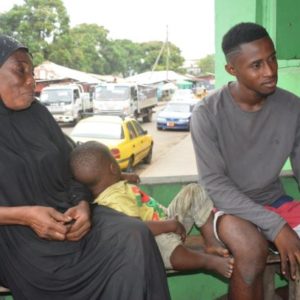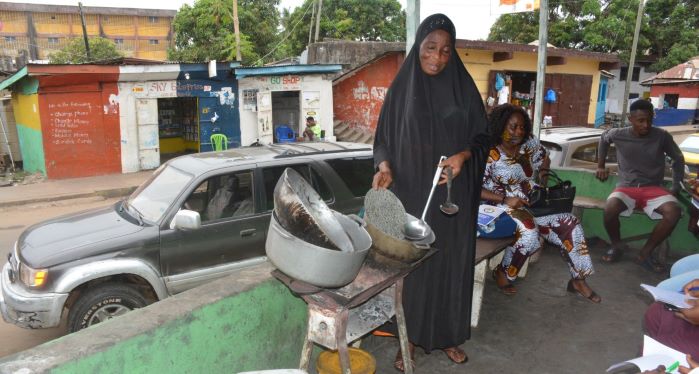PHOTO: Ramatu Shariff with her cooking utensils
Monrovia, Liberia- Liberians have once again shown how resilient they are, having weathered the civil war and Ebola. Though battered and bruised by COVID-19, they have stood strong, demonstrating a tremendous ability to withstand harsh times.
Ramatu Shariff, 55, a mother of eight boys, lives in Monrovia’s Clay Street making a living selling spaghetti, acheke (a cassava delicacy prepared with fish, sausage, and pepper sauce), and plantain chips off the front porch of her house, mainly to school children, says a news report by the UNDP.
We found her home with three of her sons: the eldest, 37, who was quietly practicing his trade – repairing shoes; Abraham, 22, who served as our interpreter; and the last born, barely two years old.
She said the COVID-19 lockdowns halved her income.
Abraham was forced to drop out of school due to a decline in their household incomes. He used to travel to neighboring Guinea to buy sneakers to sell in Monrovia. He said COVID-19 wiped out his business.
“When COVID came, people were first scared of touching the shoes in case they contracted the disease. I eventually sold all my stock then and had to live off all my earnings and savings. I have nothing to use to rebuild my business,” he said with great pain in his eyes.

Ramatu Shariff with sons at their front porch
These are some of the stories we gathered from small informal business owners in Liberia about how COVID-19 impacted their lives, and their determination to pick up the pieces and forge ahead despite pandemic setbacks because this is how they feed and care for their families. Alternative livelihood opportunities are scarce, and recovery is slow.
In response to the COVID-19 lockdowns, UNDP Liberia undertook a rapid survey of 20,000 vulnerable street vendors and home-based informal businesses across 10 counties, randomly selecting 6,000 businesses which benefited from a one-off cash transfer to tide
them over the loss of business. The cash transfers were funded by the governments of Canada and Norway.
UNDP further supported the government of Liberia to undertake a detailed digital Socio-Economic Impact Assessment (SEIA) on informal businesses earlier this year. Conducted in collaboration with Crisis Bureau’s SURGE Data Hub, the survey covered more than 8,000 households in 11 of the country’s 15 counties where Micro, Small and Medium Enterprises (MSMEs) thrive. Interim findings confirmed the importance of the informal business sector, affirming that 80 percent of the country’s population aged over 15 years are engaged in informal businesses.
More than 33,400 people in the counties of Bong, Gbarpolu, Grand Bassa, Grand Gedeh, Lofa, Margibi, Maryland, Montserrado, Nimba, Rivergee and Sinoe were interviewed between January and March 2022 about how COVID-19 had impacted their lives and businesses. The interviews were conducted by Liberia’s Institute of Statistics and Geo-Information Services (LISGIS), with coordination oversight by the Ministry of Finance and Development Planning.
“These early findings confirm the critical role of the informal sector in Liberia’s economy, particularly its potential for creating employment for the youthful population, and for the overall prosperity of the country,” said Stephen Rodriques, UNDP’s Resident Representative in Liberia. “Without the creativity, innovation and resilience of informal businesses, which provided a critical cushioning effect against COVID-19, life would have been absolutely devastating for most Liberians”.
In the coming weeks, LISGIS, working with UNDP’s SURGE Data Hub, a UNDP Crisis Bureau initiative, will further analyze the findings of the study to better understand the contributions of the informal sector to the Liberian economy, and develop a multi-vulnerability index based on the sector workers’ experiences during COVID-19. The analysis will be used to inform the government’s policies for green, inclusive post-pandemic recovery.
“The lack of solid data on the levels of informality in the economy has long been a cause of concern not only to the government, but also for our development partners,” said Hon. Samuel D. Tweah, Minister of Finance and Development Planning. “Without this data, it is extremely difficult to make good policy decisions and design appropriate programmes for the sector,” the Minister concluded.
“Often, we need information on sectoral contributions to national income, but the information has not been easy to come by. The use of digital tools for data collection and analysis for the first time ever has enabled us to more reliably gauge the full extent and contribution of the informal sector, and the impacts of the pandemic on what is truly the largest sector of the economy numerically,” said Francis F Wreh, Director General, LISGIS.
Liberia has achieved a historic milestone by successfully completing the country’s first-ever comprehensive socio-economic impact assessment, using digital tools to collect and analyze highly detailed data about informal businesses.
The precise data collected about each respondent can be used in many ways including developing a registry of informal sector workers in the country; specifically targeting social protection payments down to a household and a specific person in the home, as well as developing initiatives that are driven by what people said they need as opposed to top-down prescriptive interventions. The data will also enable the government to compute the informal sector’s contribution to the GDP using primary data from respondents, as opposed to using guesstimates.

